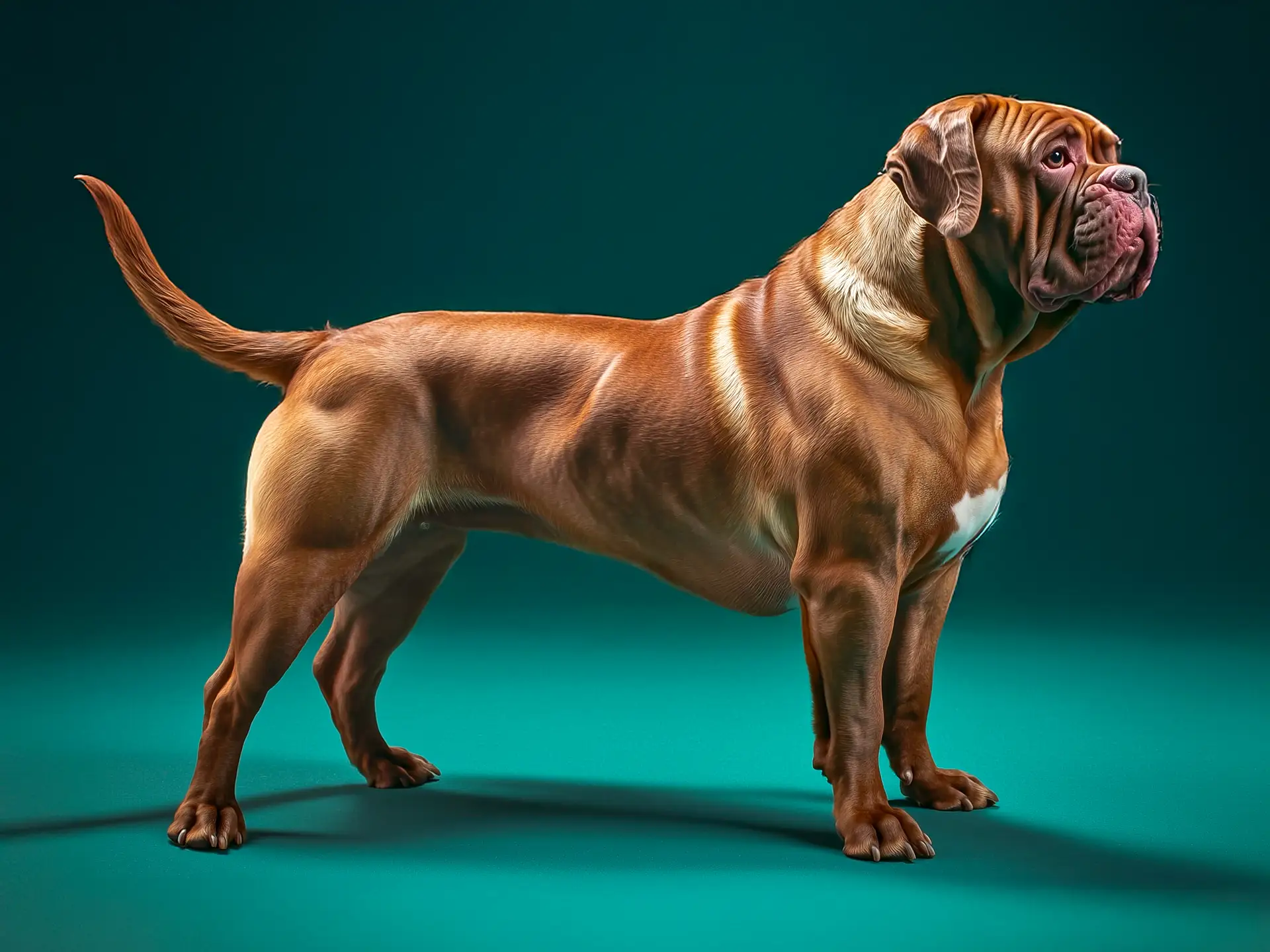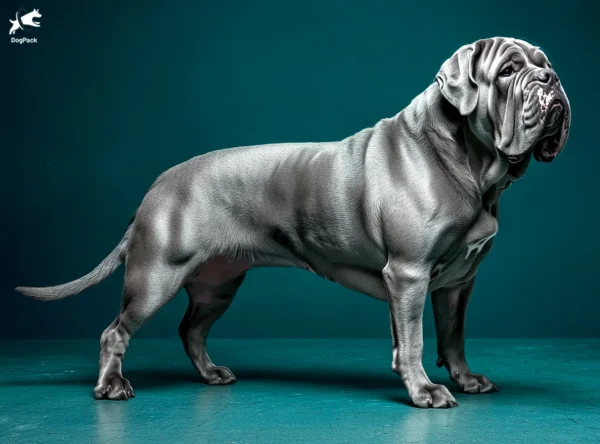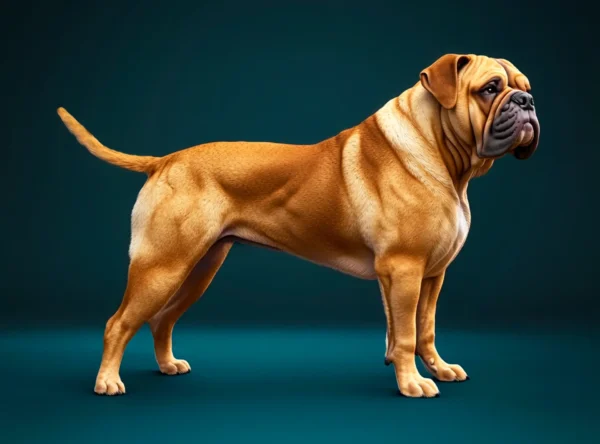Dogue de Bordeaux Dog Breed Info & Overview
The Dogue De Bordeaux, or French Mastiff, is a majestic and powerful breed with a surprisingly gentle heart. Known for its massive build and loyal disposition, this gentle giant is both calm and affectionate. With its protective instincts and deep devotion to family, the Dogue De Bordeaux is an ideal companion, offering a blend of strength, loyalty, and love to those it holds dear.
Characteristics
Pictures
Breed History
The Dogue De Bordeaux is one of the oldest French dog breeds, with a history dating back to the 14th century. Originally hailing from the Bordeaux region in France, these dogs were bred for their strength and size, serving as guardians, hunters, and even war dogs. Their imposing stature made them invaluable for tasks like pulling carts and guarding estates.
During the French Revolution, the breed nearly faced extinction as they were associated with the aristocracy. However, their resilience saw them through turbulent times, and they adapted to new roles, including herding livestock and working on farms. The Dogue De Bordeaux’s versatility and loyalty helped cement its place in French culture.
Despite their long history, the breed wasn’t widely recognized outside of France until the late 20th century. The 1989 movie Turner & Hooch starring Tom Hanks featured a Dogue De Bordeaux, bringing international attention to the breed. Since then, they’ve gained popularity as both working dogs and affectionate family companions.
Temperament, Personality
Known for their calm and affectionate nature, these dogs form strong bonds with their families. They are incredibly loyal and often act as gentle guardians in the home. While they may appear imposing, they are typically even-tempered and loving with those they trust.
When it comes to children, they are generally patient and protective, making them suitable for families with older kids. However, due to their size, supervision is recommended around small children to prevent accidental knocks. Early socialization helps them get along well with other pets, although they may be reserved around unfamiliar dogs.
With strangers, they can be cautious but not aggressive, often assessing new people before warming up. Their natural protective instincts make them excellent watchdogs. Proper training and socialization from a young age are essential to ensure they develop into well-rounded adults.
Physical Characteristics
This breed is easily recognized by its massive head, which is considered the largest in proportion to body size among all dog breeds. They have a muscular, stocky build with a broad chest and powerful limbs. Their expressive eyes are set wide apart, giving them a thoughtful, sometimes serious expression.
The coat is short and soft to the touch, typically coming in shades of fawn ranging from light to dark red. Some may have a small amount of white on the chest and toes. The Dogue De Bordeaux often sports a wrinkled face with a distinctive mask that can be either black or brown.
Another notable feature is their loose skin, especially around the neck and head, which adds to their unique appearance. Despite their imposing size, they are quite agile for their build. The Dogue De Bordeaux’s overall look exudes strength and dignity, reflecting their noble heritage.
Health Issues
Due to their large size, they are prone to certain health issues common in giant breeds. Hip dysplasia is a concern, where the hip joint doesn’t develop properly, leading to arthritis or lameness. Regular veterinary check-ups and maintaining a healthy weight can help manage this condition.
Bloat, or gastric dilatation-volvulus, is another serious condition affecting deep-chested breeds like the Dogue De Bordeaux. This life-threatening condition requires immediate medical attention. Feeding smaller, frequent meals and avoiding vigorous exercise after eating can reduce the risk.
Heart problems, such as dilated cardiomyopathy, are also seen in this breed. Regular cardiac screenings are recommended to catch any issues early. The Dogue De Bordeaux may also experience skin conditions due to their wrinkles, so keeping folds clean and dry is essential for preventing infections.
Grooming Needs
Their short coat is relatively low-maintenance, requiring weekly brushing to remove loose hair and keep the coat shiny. During shedding seasons, more frequent brushing may be needed to manage the moderate shedding. A rubber grooming mitt or a bristle brush works well for this purpose.
Attention should be given to their facial wrinkles, which need regular cleaning to prevent moisture buildup and bacterial infections. Gently wipe the folds with a damp cloth and thoroughly dry them afterward. This simple routine can help keep skin issues at bay.
Ear care is also important, as their folded ears can trap debris and moisture. Regularly check and clean their ears with a vet-recommended solution. The Dogue De Bordeaux may drool, so keeping a towel handy and wiping their mouth can help maintain hygiene.
Exercise Requirements
While they are not as high-energy as some breeds, they still require daily exercise to stay healthy and prevent weight gain. A moderate-paced walk for 30 to 60 minutes each day is usually sufficient. They enjoy leisurely strolls where they can take in the sights and smells.
Engaging in low-impact activities is ideal, especially considering their susceptibility to joint issues. Swimming can be a good option, providing exercise without putting stress on their joints. Avoid strenuous activities like jumping or long runs, particularly in hot weather due to their sensitivity to heat.
Mental stimulation is also important, so interactive toys and gentle play sessions can help keep them engaged. The Dogue De Bordeaux appreciates spending time with their family, so incorporating exercise into bonding time is beneficial. Always monitor them during activity to prevent overexertion.
Training Tips
Early socialization and consistent training are crucial for this breed, given their size and strength. They are intelligent but can be stubborn, so patience and positive reinforcement techniques work best. Harsh methods may cause them to shut down or become uncooperative.
Establishing leadership early on helps set boundaries and expectations. Short, engaging training sessions keep their attention better than long, repetitive ones. They respond well to treats, praise, and play as rewards for good behavior.
Socializing them with different people, animals, and environments reduces the likelihood of shyness or overprotectiveness. The Dogue De Bordeaux benefits from obedience classes, which provide structure and expose them to new situations. Consistency is key to raising a well-mannered companion.
Nutrition, Diet
Feeding the Dogue De Bordeaux requires attention to their unique nutritional needs as a giant breed. They benefit from a high-quality, large-breed dog food formulated to support joint health and controlled growth, especially during puppyhood. Rapid growth can lead to skeletal issues, so a diet rich in balanced nutrients is essential.
Adult Dogue De Bordeaux typically consume 4 to 7 cups of dry food per day, divided into two meals to reduce the risk of bloat. The exact amount depends on their age, weight, metabolism, and activity level. It’s important to monitor their calorie intake to prevent obesity, which can exacerbate joint problems.
Including supplements like glucosamine and chondroitin may support joint health, but consult your veterinarian before adding them to their diet. Fresh water should always be available, and avoid feeding immediately before or after exercise. The Dogue De Bordeaux thrives on a diet tailored to its specific needs.
Adoption, Breeders
When considering adding a Dogue De Bordeaux to your family, it’s crucial to find a reputable breeder who prioritizes health and temperament. Look for breeders who perform health screenings for common genetic issues like hip dysplasia and heart conditions. Visiting the breeder and meeting the puppy’s parents can provide insight into their future development.
Rescue organizations dedicated to the breed are another excellent option. The Dogue De Bordeaux Rescue specializes in rehoming these dogs and can help match you with a suitable companion. Adopting an older dog can be rewarding and gives a deserving dog a second chance.
Always avoid puppy mills or pet stores that may not prioritize the well-being of the animals. The American Kennel Club Marketplace is a resource for finding AKC-registered breeders. Doing thorough research ensures you bring home a healthy and well-adjusted Dogue De Bordeaux.
Family Pet?
The Dogue De Bordeaux can make a wonderful family pet for households that understand their needs. Their affectionate and loyal nature means they often form strong bonds with family members. They are generally patient with children, especially when raised together, but their large size requires supervision to prevent accidental knocks.
They can coexist with other pets if properly socialized from a young age. Early exposure to different animals helps reduce territorial behavior. However, caution is advised with smaller pets due to their strong protective instincts. Consistent training reinforces positive interactions within the household.
Given their protective tendencies, they may be reserved around strangers, which can be beneficial for families seeking a guard dog. Providing them with love, structure, and socialization makes the Dogue De Bordeaux a devoted and reliable family companion.
Right For You?
If you’re considering the Dogue De Bordeaux, evaluate whether you can meet their specific needs. They thrive in homes with space to accommodate their size, and a securely fenced yard is ideal. Apartment living may be challenging due to their dimensions and exercise requirements.
Experienced dog owners who can provide firm yet gentle leadership are best suited for this breed. They require consistent training and socialization to become well-mannered adults. Their moderate energy levels mean they enjoy leisure time but still need daily activity to stay healthy.
Families who value a loyal, protective companion will find the Dogue De Bordeaux a rewarding addition. However, potential owners should be prepared for the responsibilities that come with a giant breed, including higher costs for food and veterinary care. Careful consideration ensures a happy partnership.
Conclusion
Bringing a Dogue De Bordeaux into your home is a commitment to a gentle giant with a heart full of love. Their loyalty and protective nature make them exceptional companions for the right family. If you have the space, time, and resources to dedicate to their care, you’ll be rewarded with a devoted friend who enriches your life. However, their size and specific needs mean they’re not the perfect match for everyone. The Dogue De Bordeaux thrives with owners who can provide consistent training, socialization, and a nurturing environment. If you’re ready to embrace the joys and challenges of this remarkable breed, you’ll find a companion who is as steadfast as they are affectionate.
FAQs
-
Are Dogue De Bordeaux suitable for novice dog owners?
The Dogue De Bordeaux is generally not recommended for first-time dog owners due to their size, strength, and need for consistent training. They thrive with experienced owners who understand the requirements of large, protective breeds.
-
How do Dogue De Bordeaux handle extreme weather conditions?
Dogue De Bordeaux can be sensitive to extreme temperatures. Their short coat offers minimal insulation in cold weather, and they can overheat easily in high temperatures. It’s important to provide appropriate shelter and avoid strenuous activity during extreme conditions.
-
Do Dogue De Bordeaux have a high prey drive?
While not typically known for a high prey drive, the Dogue De Bordeaux may still chase smaller animals due to their protective instincts. Early socialization and training can help mitigate unwanted chasing behaviors.
-
Is the Dogue De Bordeaux prone to separation anxiety?
The Dogue De Bordeaux forms strong bonds with their family and may experience separation anxiety if left alone for long periods. They do best in homes where someone is present most of the time or can gradually acclimate them to alone time.
-
What type of home environment is best for a Dogue De Bordeaux?
A spacious home with a securely fenced yard is ideal for a Dogue De Bordeaux. They need room to move comfortably and benefit from a quiet environment without excessive noise or chaos, which can cause stress.
Breed Ratings
The Dogue De Bordeaux is moderately intelligent but can be stubborn. Consistent, positive training methods yield the best results.
While they enjoy playtime with family, they are generally calm and laid-back, preferring relaxed activities over high-energy games.
The Dogue De Bordeaux has a low to moderate energy level, requiring daily walks but also content with lounging at home.
They shed moderately year-round, with increased shedding during seasonal changes. Regular brushing helps manage loose hair.
Not known for a strong prey drive, but may chase smaller animals if not properly socialized. Supervision is recommended.
Their short coat is easy to maintain with minimal grooming. Regular care of wrinkles and ears is necessary to prevent issues.
With patience and consistency, they can be trained effectively. Early socialization and positive reinforcement are key.
They prefer company and may develop separation anxiety if left alone for extended periods. They thrive with companionship.
Generally quiet, they bark only when necessary, such as alerting to strangers. Not prone to excessive vocalization.
The Dogue De Bordeaux is a heavy drooler, especially after eating or drinking. Owners should be prepared for slobber.
Can get along with other dogs if socialized early. May be reserved or dominant with unfamiliar dogs without proper introduction.
Prone to certain health issues common in large breeds, including hip dysplasia and heart problems. Regular vet care is essential.













